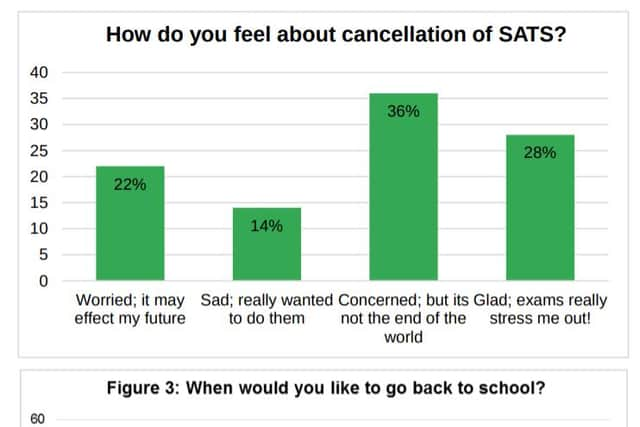Sheffield primary pupil creates survey to understand impact of coronavirus lockdown on city’s schoolchildren


Sarah Jannat Iqbal, who is a pupil at Avicenna Academy, in Darnall, says she launched the online survey to find out how the government measures imposed in March had affected children in both primary and secondary school.
With a little help from her father, a teacher, she sent the survey to her teachers and friends who then shared it to others across Sheffield.
Advertisement
Hide AdAdvertisement
Hide AdIn total, 162 people gave their views with each answering 15 questions which explored the physical, mental, social, and educational effects of the lockdown.


Explaining her reasoning behind the survey, she said: “Coronavirus pandemic has affected millions of people worldwide. It started spreading in UK in March and hence, government decided to impose lockdown and close schools on March 20, 2020, to reduce spread of the virus. Students have been at home since then.
“Lockdown, inability to meet friends and frequent exposure to troubling corona-virus news on media may have a variety of detrimental effects on student. School closures would also impact on education.
“Students may be hearing in the news about the possibility of schools opening as the spread of virus is slowing down. It may be upsetting for children that no one has really cared to establish the effects of all these issues on their body and mind and how they feel about all the issues related to them.”
Advertisement
Hide AdAdvertisement
Hide AdThe children who took part in the survey ranged from five to 15-years-old, with 64 per cent of responses from those in primary school and 34 per cent from secondary.
Of those surveyed the majority, 72 per cent, said they were ‘concerned or worried’ about the coronavirus as a whole, while 15 per cent were ‘scared’ and 13 per cent weren’t bothered.
When asked about the reason, most respondents were worried about themselves, family members or friends getting ill. Some also had worries about death from coronavirus
Regarding social interaction, 43 per cent said they were able to stay in touch with friends over the phone or on social media but the majority were still missing friends and relatives.
Advertisement
Hide AdAdvertisement
Hide AdNearly half of the students admitted they were doing little or no physical exercise during the lockdown, with 93 per cent saying their daily screen time – whether it be for education, entertainment or both – had increased.
The majority of respondents, 88 per cent, felt the lockdown had affected their education.
The students also revealed that meeting friends and enjoying play and break times were among the aspects they missed about not being at school.
Amongst the students who were due to take their SATs exam this year, 72 per cent were concerned, worried or sad while 28 per cent were glad to be free of exam stress.
Advertisement
Hide AdAdvertisement
Hide AdAnd, although students were keen to go back to school, 52 per cent did not want schools to open until the Coronavirus had been eradicated.